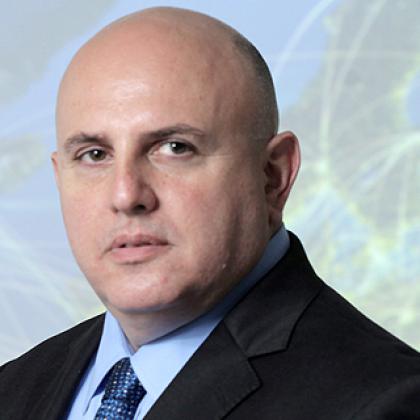Israel’s Four Factors for Successful Cyber Recruitment
Militaries need to recruit among the most talented professionals, especially those with high cyber-fighting potential, putting them in competition with better paid private sector jobs. Israel has created programs to help members of the army leverage their experience with technology for a career in innovation in other sectors.
The backdrop of this recruiting reality is that combat roles, or maneuvering units as they are called in the Israeli defense establishment, are increasingly less attractive for recruits.
“According to IDF statistics, there has been a slow but steady decline among new soldiers inducted for mandatory service in their willingness to serve in ‘maneuvering units,’" the late Shmuel Even, senior fellow at Tel Aviv University’s Institute for National Security Studies explained in a 2017 article.
Most defections away from combat happen for a visible promise in civilian life after the draft.
Factor 1: What’s in it for me?
The after-military service narrative is clearly stated and demonstrated, offering hybrid training opportunities that justify low salaries during time in the service and putting young people in line for plum technology jobs when rejoining civilian life
“Many recruits prefer technology and intelligence units, which offer an advantage in employment after mandatory military service,” Even explained in the article.
As war becomes hybrid, so do cyber war roles; and the country is using that to its advantage.
“To develop cyber tools, [cyber warriors] need to understand the human activity in cyberspace. In other words, the distance between the fighter and the engineer is shrinking and they work shoulder to shoulder in building joint techno-operational capability,” Eviatar Matania, professor at the School of Political Science, Government and International Affairs at Tel Aviv University, stated in a paper.
Factor 2: Tiered programs for multiple roles in cyber, technology and intelligence
The widest program inducting cyber recruits after high school is Psagot, and that’s where most interested in STEM gravitate.
“Psagot helped fill the IDF’s technology manpower pyramid: at its base is the academic reserve, then the academic reserve’s excellence program,” Matania said.
The country runs another special cyber recruiting program to go beyond the usual talent pools.
“[The] Atidim program was also established, which aims to bridge two gaps in the IDF’s technological manpower roster: first, an increasing shortage of engineers at the base of the technological manpower pyramid (the academic reserve) and not only at the top; second, increased recruitment to the academic reserve among youth from Israel’s geographic and social periphery, as part of an effort to change the social stratification and grant equal opportunities to youth from the periphery,” explained Matania in his research paper.
A third avenue of entry into the Israeli cyber force is from within the IDF, using multiple initiatives designed for specific career and tactical opportunities.

The Israeli Defense Force began to build specialized training programs within the framework of conscription for developing skilled personnel for military cyber.
Factor 3: Let new initiatives “fail fast”
“In the first two decades of the 2000s, the IDF began to build specialized training programs within the framework of conscription for developing skilled personnel for military cyber, which cannot be found in places outside of the military,” according to Matania.
These follow the “fail fast” business concept to keep these efforts updated with social and defense trends.
“Programs are established at a rapid pace; they invite wide interest and enrollment; and they have begun to constitute a major path in the IDF’s conscription system quantitatively as well,” states Matania.
Israel has a history of creating programs that identify and empower STEM high performers evolving from elite to hybrid.
Four decades ago, the Talpiot program trained only top performers in STEM. It aims at the top 0.1% of the population and has produced about one thousand graduates. Their posts are tailored in critical positions in the IDF’s core research and development activities, according to Matania.
This program draws attention and envy, inspiring many; but the country needs many more recruits in its cyber ranks than those this initiative produces. Therefore, the lower level Psagot is reported to have a greater impact than the Talpiot.
Factor 4: Hyper-specialized recruitment after recruitment
The fact that everyone has to go through compulsory military service, which is unique to Israel, also helps increase the talent pool at a time when young people are starting out in their professional careers.
“The conscription model enables access to almost the entire population of the country; hence the possibility of screening and locating the STEM elite of the entire country. As a result, the security establishment succeeds in reaching the best and most suitable in the State of Israel, identifying the highest quality people in the country and tracking them into military R&D in the first part of their professional career,” according to Matania.
This exposure to defense institutions early in their careers and lives creates a reinforcement towards fields of interest in security.
“The majority of individuals from the STEM elite have not yet chosen a preferred academic profession, it is possible to channel them toward the scientific and technological professions that the army needs, not through compulsion but through explanation and appropriate emphases,” Matania explained.
The dividends for the IDF: economic savings and longer time in service
The wider programs also have clear economic implications for these top STEM operatives. The military saves in salaries as it serves as a conduit for jobs in better funded agencies and the private sector.
“This unique tracking phenomenon also has economic implications. The service of this elite in the IDF as part of mandatory and low-ranking salaried service is incomparably cheaper than a scheme in which the army would have tried to recruit leading civilian experts, even if it was plausible. The experience of the nonmilitary security agencies proves that it is very difficult to recruit this elite, as even though they are able to offer better working conditions and pay than the IDF, they are unable to compete with the high-tech industry, and they too are forced to rely on IDF conscription for their core R&D. It is no wonder these elite personnel are seen as a national resource that the army shares with the rest of the security agencies that need them,” Matania evaluated.
Meanwhile, mandatory military service in Israel averages two and half years. Nevertheless, cyber warriors are required to stay at least twice as much. Some elite members of the STEM IDF’s workforce may have to spend a decade of service before returning to civilian life, especially those enrolled in Talpiot. Still, Matania reported that there’s a steady and predictable flow of recruits entering every year as the long term benefits outweigh the years of low compensation in the service.




Comments